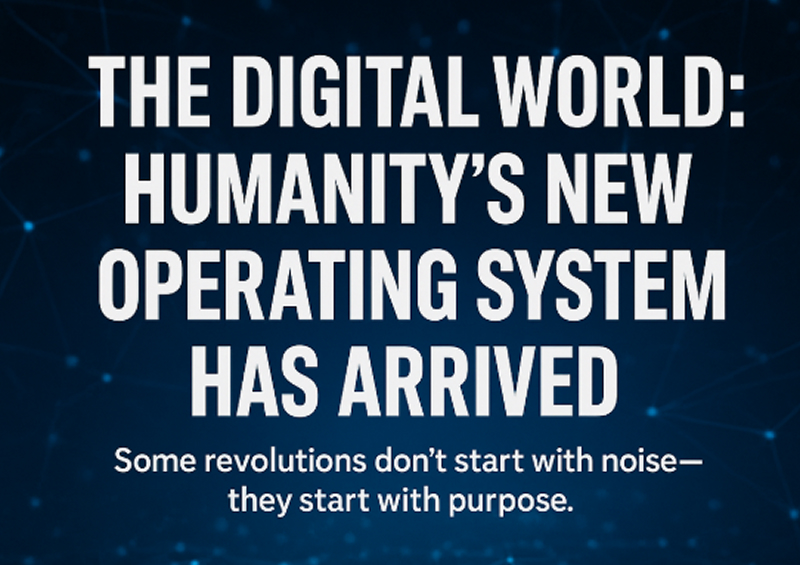The Digital World: Humanity’s New Operating System Has Arrived
By Brandi Green, Global Technology Correspondent
Published by ThinkClearly
May 2025
Some revolutions don’t start with noise — they start with purpose.
As governments tighten controls, corporations hoard data, and artificial intelligence begins to shape the very edges of human consciousness, one movement is rewriting the rules at the protocol layer — not for profit, but for liberty.
It’s called The Digital World, and according to many in the tech community, it could be the most important project of the 21st century: a decentralized operating system for humanity, built not to serve capital—but to restore sovereignty, identity, and ownership to the individual.
Unlike other decentralized systems that stop at cryptocurrency or messaging, the Digital World aims to replace the entire civic, legal, and financial fabric of centralized society. This is not just a blockchain—it’s a new civilization layer.
A SYSTEM FOR THE PEOPLE
At its core, the Digital World runs on a decentralized identity engine that allows every human to control their own data, reputation, assets, and communication—backed by derived cryptographic keys that prevent AI or machine learning exploitation. No public wallets, no metadata leakage, no centralized validators. Just you, your assets, and your rights—fully portable, legally sovereign, and universally verifiable.
Surrounding this core identity system is a full-stack architecture including:
- Digital Asset Ownership: Gold and silver-backed tokens—not speculative crypto, but tangible, redeemable, and spendable receipts.
- Peer-to-Peer Commerce: No middlemen. No surveillance. Instant cross-border trade and payments.
- Decentralized Legal & Estate Planning: Built-in smart estate protocols, asset inheritance, and digital trust layers.
- Decentralized Communication and Coordination Tools: Encrypted, person-to-person systems for secure collaboration.
The project also introduces a built-in private AI assistant—not to surveil or sell, but to serve. This AI doesn’t record your data or mine your conversations. Instead, it helps resolve lawful disputes, file trademarks, copyrights, and patents, and even guides individuals through legal defense and sovereign filings—especially in cases where traditional systems have failed them.
COMPETITION: WHERE OTHERS FALL SHORT
Despite enormous resources and head starts, legacy blockchains and financial networks have stumbled in delivering systems that truly serve the people.
- Ripple (XRP) is fast and enterprise-friendly—but heavily centralized and increasingly aligned with institutional finance.
- Stellar (XLM) enables low-fee payments—but struggles with ecosystem traction and real-world use beyond remittances.
- Ethereum remains the programmable juggernaut—but it is expensive, congested, and vulnerable to AI-based gaming of smart contracts.
- Solana boasts speed—but suffers from outages, centralization of infrastructure, and instability.
- Bitcoin is trusted as a store of value—but lacks programmability and any identity or legal layer.
- EOS and Cardano, once hailed as Ethereum challengers, have largely faded from relevance or failed to achieve meaningful developer and user adoption, mired by unclear direction, limited traction, and governance missteps.
- Even Visa’s AI-Commerce initiative, launched with powerful partners like OpenAI and Microsoft, is still centralized at its core—embedding surveillance and profit incentives at every layer.
The Digital World, by contrast, is fee-less, sovereign-first, AI-resilient, and completely uncorrupted by legacy finance, big tech, or VC control. It is designed for one audience: the free human being.
REAL SYSTEMS, NOT JUST PROMISES
What makes the Digital World more than a whitepaper dream?
It’s already powering real platforms:
- ClearSoftware – The decentralized “everything app” integrating identity, ownership, payments, communications, and community.
- ClearCellular – Phones and private networks where you own your data, not Google or Apple.
- ClearCredit Union – Offering silver- and gold-backed loans, digital deposits, and reputation-based credit outside traditional FICO models.
- ClearExchange – Where real-world assets (homes, gold, vehicles) trade digitally without centralized escrow or fees.
- Digital Courts & Dispute Engines – A peer-verified, AI-assisted resolution framework for legal and civil issues across jurisdictions.
A LEGAL AND SPIRITUAL FOUNDATION
While most technologies look to disrupt existing systems, the Digital World respects ancient truths. Its legal framework is built through sovereign micro-jurisdictions—like the Restored Kingdom of Hawaiʻi—that anchor legal recognition and uphold values of peace, intergenerational wealth, and divine purpose.
Its Bill of Rights affirms the right to choose one’s currency, preserve one’s data, raise one’s children, and pass on one’s wealth—all while rejecting war, surveillance, and coercive centralization.
THE VERDICT
As governments, AI conglomerates, and legacy banks compete for control of the post-2025 internet, the Digital World offers something radically different:
A future where humanity reclaims its tools of coordination, expression, and ownership.
If successful, it won’t just replace today’s tech giants—
It will make them irrelevant.
For the first time in a generation, the system doesn’t exist to extract from the people…
It exists to empower them.
And that might just be the most revolutionary idea of all.





